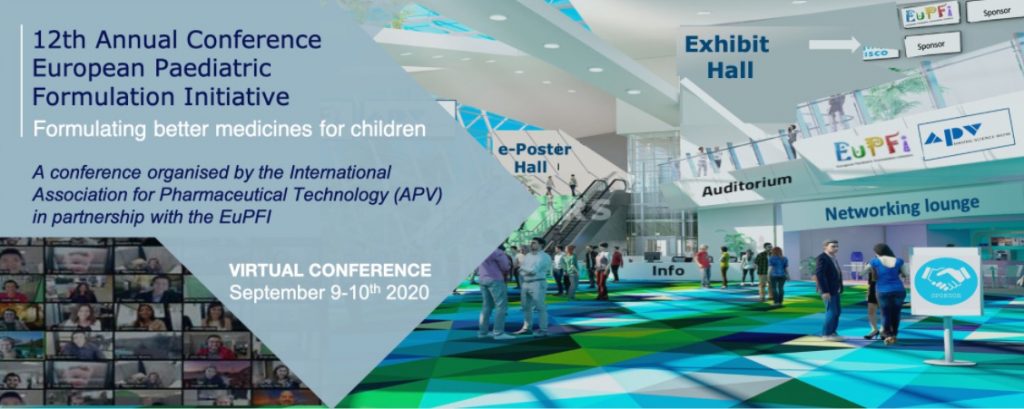The 12th annual conference of the European Paediatric Formulation Initiative (EuPFI) has been held virtually on the 9th and 10th of September 2020. The conference was organised by the International Association for Pharmaceutical Technology (APV) in partnership with the EuPFI. The main focus of the conference was formulating better medicines for children – meeting the needs of the children. The area of paediatric formulation development continues to evolve. While the knowledge and the frameworks for developing paediatric drugs and formulations are available, new efforts are needed to accelerate development of optimal drugs and formulations for children. EuPFI 2020 showcased the current situation and evolving innovations with the potential to make a long-term transformational change to paediatric medicines.

Donato Bonifazi, from Consorzio per Valutazioni Biologiche e Farmacologiche and EPTRI Coordinator, attended the conference with a poster entitled “Paediatric formulation research capabilities in Europe: the European Paediatric Translational Research Infrastructure EPTRI roadmap”, in which he presented the work performed by EPTRI to solve the needs of paediatric drug inadequacy specifically within the platform dedicated to formulation activities. As first step, a set of surveys has been sent to experts in formulations to build an inventory of available competencies and to the potential user community (e.g. scientists and experts, Sponsors and Contract Research Organisations, preclinical researchers and clinical investigators) to give evidence of the needs of focused and dedicated actions in this paediatric research landscape. These actions showed the competences of 29 research units grouped in four areas: pre-formulation capabilities, formulation development, assessment of drug delivery systems, and palatability assessment with a significant participation from UK, Italy and Greece. Future networking and outreach efforts will be performed to achieve a more balanced pan-European distribution of research units involved in paediatric formulation.
Elisa Alessandrini, from University College London, also attended the conference with a poster entitled: “How do European children like their oral dosage forms? A feasibility study about children’s involvement in research via the European Paediatric Translational Research Infrastructure”. The poster presented the results of the EPTRI online survey on oral formulations that was distributed across several European countries to compare and contrast children’s oral dosage forms perceived preferences in Europe and to explore the feasibility of using the Young Persons Advisory Groups (YPAGs) to involve children in paediatric research. Results showed that perceived preferences for dosage forms primarily differed based on age and health status of the children. Liquid was the most favourite dosage form of the youngest and those without any chronic condition. While solid dosage forms, e.g. tablets and capsules, were preferred by adolescents and those with a chronic disease taking medicines frequently. These results demonstrate the importance of involving children as active stakeholders to understand what they like and to create adequate and suitable paediatric dosage forms.
The video posters are available on the EPTRI YouTube channel at the following links:
